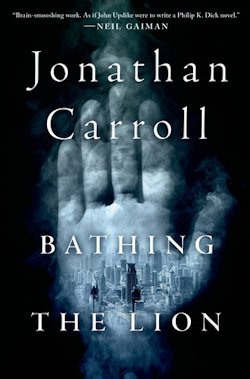Jonathan Carroll’s first full-length work of fiction in six years is as rooted in the real as it is the surreal its synopsis suggests. Bathing the Lion is about a quintet of cosmic mechanics who can read minds and remake the mundane recovering their talents in advance of the arrival of a fearsome force called Chaos—which seems, I’m sure, like a properly science fictional plot. But it’s not.
To wit, the World Fantasy Award-winning author evidences precious little interest in the ultimate result of this clash between… not good and evil, exactly, but order and its opposite. Rather, Carroll restrains his tale to the strictly small scale, in the process pointedly refusing the reader’s needs.
Bathing the Lion is a lot of things, but one thing it isn’t is exhilarating. In fact, there’s very little actual action. Instead, expect a whole lot of talking, some potted philosophy and a dream sequence that lasts the entire first act…
Not that we’re aware of its nature, initially. By all accounts, the book’s first third appears to be an introduction to the five former mechanics we foresee facing off against the coming Chaos. They don’t know their nature either. It takes an elf called Keebler—of course—to explain, albeit briefly, the state of play:
There are mechanics. They run things. They do their jobs for a while, some centuries usually, and then retire. Or rather they have to retire—it’s the rule. […] When they’re finished, when they’re retired, some are transformed into humans. As soon as it happens they forget everything about their past existence.
But the past has a habit of coming back—and indeed it does, like an old injury awakened in the winter, when Bathing the Lion’s proliferation of protagonists find themselves sharing a single vision:
Whatever was happening to them was clearly out of their control. They were given glimpses, peeks under the curtain, flashes of understanding and insight into each other’s lives, histories, hearts and secrets. It was jarring and riveting in its way but most of all unstoppable. As the five people stood there, the most intimate knowledge of each other’s lives entered each other’s minds in spits and spurts, fragments and odd-shaped pieces like shrapnel.
The experience changes them, rearranges them—in different ways, I dare say:
Jane pressed the heels of both hands against her forehead as if suffering a migraine. Edmonds stared straight ahead, transfixed, as did Kaspar. Dean and Vanessa jerked their heads as if being poked from all sides by invisible fingers.
Sitting in Blackwelder, Josephine clapped her hands and bounced up and down, much to the chair’s discomfort. It protested, “Stop that. Please, it hurts!”
But the mechanic who had come to earth disguised as a little girl to help these five people didn’t stop bouncing because she was too excited. Finally it was happening—the joining had begun.
Incidentally, yes: there’s a chatty chair; also a friendly red elephant and a man with a hand made of ants. Bathing the Lion is seriously weird, sometimes—and also, occasionally, quite, quite wonderful. Some, so forth, will find it fascinating. Others, infinitely frustrating. After the fact, I found myself careening between these extremes of feeling. I was rejected by this book—repeatedly—yet renewed, too.
Bathing the Lion’s biggest problem is the blandness betwixt all this. For starters, the characters. I grant that they are differentiated—there’s the diva, her long-suffering husband, the widower, the bachelor and the bartender—but in practice few of the five represent a great deal more than their roles. Aside Edmonds, a sympathetic sort because of his loss, and Kaspar, who remembers more about his last life than he lets on, I couldn’t, in truth, have cared less about the emotional states and eventual fates of Carroll’s major players.
Nor is what we might politely call the plot—it’s only a premise, essentially—resolved in anything resembling a satisfactory fashion. Bathing the Lion ends before we’ve even cottoned on to what’s going on, far less what, if anything, it might mean. As Jane complains:
“There were so many different stories and unconnected details… it felt like a hodgepodge of all our experiences scrunched together without any kind of filter to keep the stories separate. There was no through line; I can’t make sense of it.”
“Had it really happened?” asks one character in advance of the anticlimactic last act. And “did it matter?” Your answer to that latter will determine whether or not you’re apt to enjoy this deliberately disjointed novel. For my part, happy as I am to have Jonathan Carroll back, Bathing the Lion seems in summation substantially less valuable than the man’s many magical realist masterpieces. It has its moments, I hasten to add, but much of the rest of the text is at most mediocre.
Bathing the Lion is available October 21st from St Martin’s Press.
Niall Alexander is an extra-curricular English teacher who reads and writes about all things weird and wonderful for The Speculative Scotsman, Strange Horizons, and Tor.com. He’s been known to tweet, twoo.










